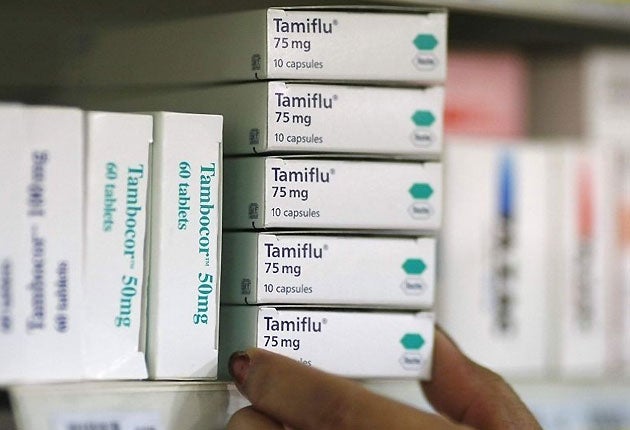Online buyers warned over fake flu drugs

Your support helps us to tell the story
From reproductive rights to climate change to Big Tech, The Independent is on the ground when the story is developing. Whether it's investigating the financials of Elon Musk's pro-Trump PAC or producing our latest documentary, 'The A Word', which shines a light on the American women fighting for reproductive rights, we know how important it is to parse out the facts from the messaging.
At such a critical moment in US history, we need reporters on the ground. Your donation allows us to keep sending journalists to speak to both sides of the story.
The Independent is trusted by Americans across the entire political spectrum. And unlike many other quality news outlets, we choose not to lock Americans out of our reporting and analysis with paywalls. We believe quality journalism should be available to everyone, paid for by those who can afford it.
Your support makes all the difference.The Government's Chief Medical Officer today warned the public to avoid panic-buying "counterfeit" anti-swine flu drugs online after it was revealed the number of new cases could reach 100,000 per day.
Sir Liam Donaldson, who confirmed yesterday that the UK has moved past the stage of containing the swine flu outbreak and into the "treatment phase", said there was no need for people to resort to the internet to self-medicate amid fears over the spread.
He said Britain had a massive stockpile of Tamiflu and would be one of the first countries to have access to a vaccine, with the first supplies arriving at the end of August.
Sir Liam told GMTV: "There's generally a growth in people ordering drugs from the internet worldwide and there's a lot of concern amongst health authorities that people might buy counterfeit drugs.
"I think this is a similar situation - people shouldn't buy Tamiflu from the internet.
"We have got a massive stockpile in this country and everybody can have access to it through the National Health Service."
Sir Liam added he was "surprised" health services had controlled the virus for as long as they had. The first case in Britain was recorded in April.
He said: "We have been dealing with it very aggressively so far - we have investigated every case, we've treated their contacts, we've closed schools and all of that has helped slow the spread.
"We are surprised we have been able to run it as long as we have like this. Flu viruses spread extremely quickly so this is very much going as expected."
Health Secretary Andy Burnham has said Britain could see more than 100,000 cases of swine flu per day by the end of August.
In the UK three people - who all had underlying health problems - have died after contracting the virus.
The Government has signed contracts to secure enough vaccine for the whole population, he told MPs.
The first will become available next month, with enough for 30 million people to be vaccinated by the end of the year.
Under the new treatment phase, the Health Protection Agency will take a step back from dealing with the outbreak.
The daily updates on confirmed cases will end and "more general" estimates of numbers will be given.
Efforts to trace people who have been in contact with swine flu cases will stop and schools will not close when hit by the virus, unless particular circumstances make it necessary.
Anti-virals will only normally be offered as treatment, not for prevention, and pressure on GP and hospital services will ease as more people receive diagnosis and treatment via other routes.
Mr Burnham said this would initially be through the NHS website or the swine flu information line but would subsequently be via the National Pandemic Flu Service.
Scottish Health Secretary Nicola Sturgeon announced similar changes to the flu strategy at a briefing in Edinburgh.
Scotland's chief medical officer, Harry Burns, said the country could expect one tenth of the UK cases of swine flu - about 10,000 cases a day in Scotland by August.
London and the West Midlands have already had enough cases to force health officials to adopt the policy of outbreak management.
Asked why certain areas had become swine flu hotspots, Mr Burnham suggested yesterday close family ties could be to blame.
:: There are three stages of swine flu management:
Containment: People with swine flu have their diagnosis confirmed by lab reports. They and anyone who has come into contact with them are given the anti-viral drug Tamiflu. Most parts of the UK are still in this phase;
Outbreak management: People are diagnosed by a health professional without the need for lab confirmation, and are given Tamiflu. Swabbing takes place only on a small sample of cases. People who have come into contact with a swine flu victim are unlikely to receive Tamiflu as a precaution;
Treatment: The detail of this phase is still being worked out. The Government envisages that not everybody with swine flu will receive Tamiflu, which may be reserved for at-risk groups.
Join our commenting forum
Join thought-provoking conversations, follow other Independent readers and see their replies
Comments